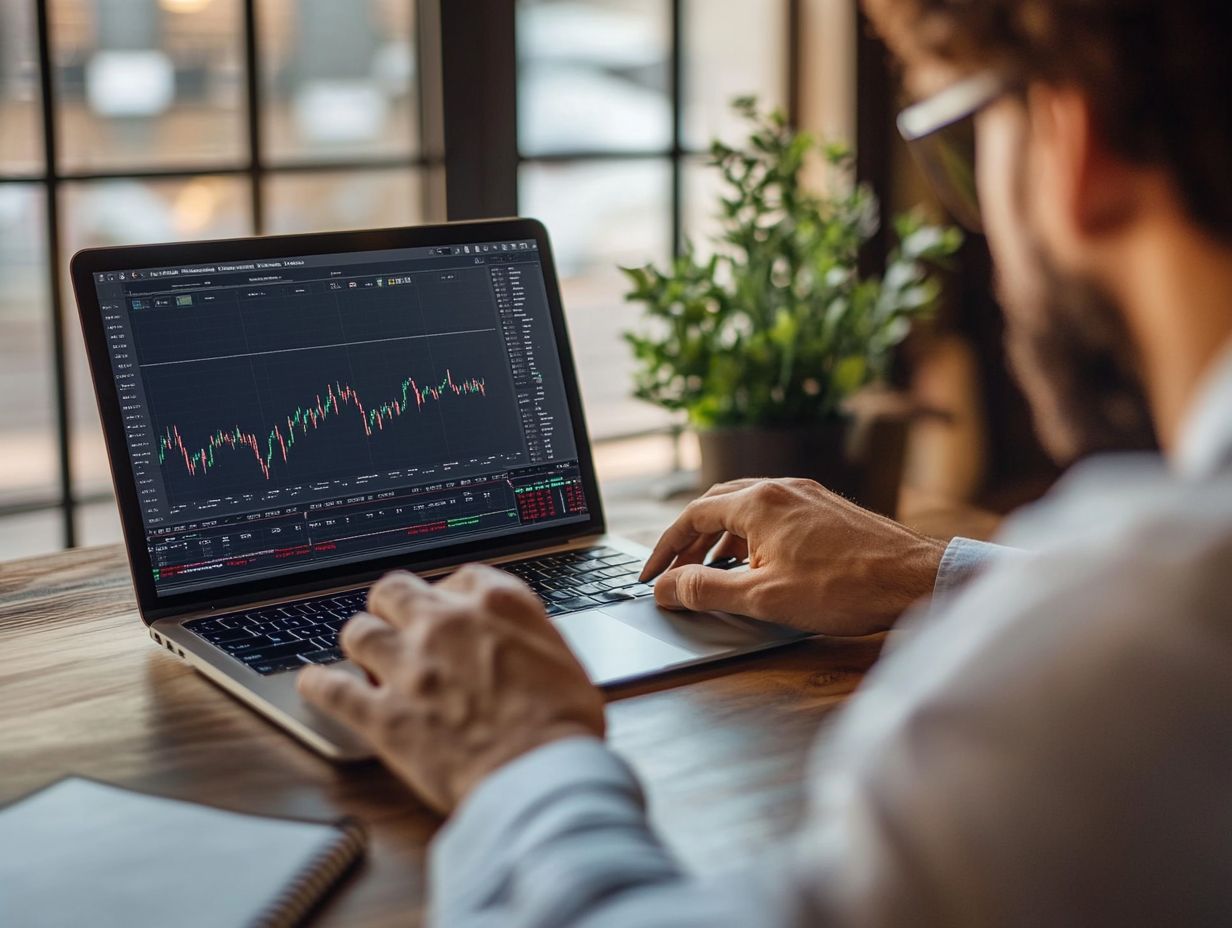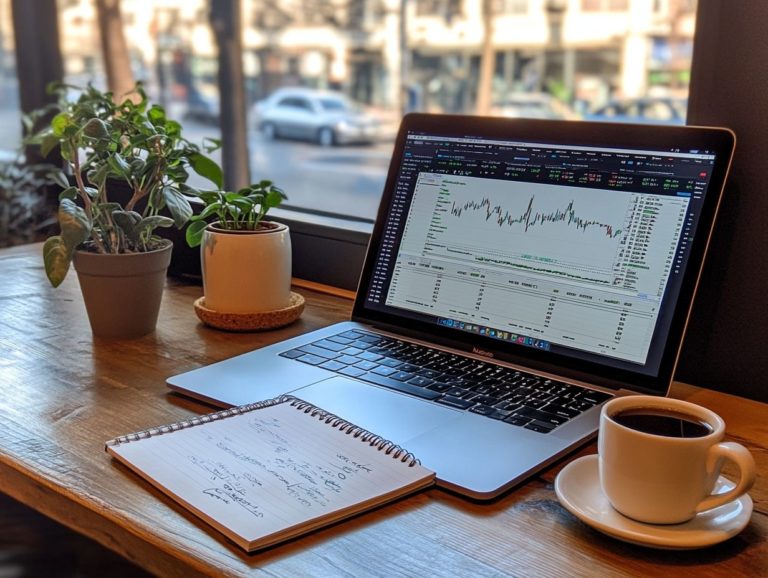How to Combat FOMO in Trading
In today s fast-paced trading environment, the fear of missing out (FOMO) can easily lead you to make impulsive decisions. This can potentially derail even the most experienced traders.
Grasping the dynamics of FOMO is essential for maintaining a disciplined approach to your trading strategy.
This article delves into what FOMO really is, examines its detrimental effects on decision-making, and helps you identify common triggers that may set it off.
It also outlines effective strategies for managing FOMO and emphasizes the importance of having a solid trading plan and a supportive network.
Let s dive in and revolutionize your trading mindset today!
Contents
- Key Takeaways:
- Understanding FOMO in Trading
- The Negative Impact of FOMO on Trading
- Identifying FOMO Triggers
- Strategies for Combating FOMO
- Developing a Trading Plan
- Seeking Support and Accountability
- Frequently Asked Questions
- What is FOMO in trading and why is it harmful?
- How can I recognize and combat FOMO in trading?
- What are some practical strategies I can use to overcome FOMO?
- How can I avoid comparing myself to other traders and feeling FOMO?
- What are the potential consequences of giving in to FOMO in trading?
- Are there any advantages to experiencing FOMO in trading?
Key Takeaways:

- Don’t let FOMO control your trading decisions. Stay disciplined and stick to your strategy.
- Identifying and understanding your FOMO triggers can help you manage and combat them effectively.
- Having a well-developed trading plan and a supportive community can help you avoid FOMO and make more rational trading decisions.
Understanding FOMO in Trading
Understanding FOMO, or the fear of missing out, in trading is essential for you. This applies whether you’re just starting out or have been in the game for a while.
This emotional phenomenon can profoundly impact your trading decisions, often prompting quick decisions in volatile markets.
In today s world, where social media and a vibrant trading community dominate the landscape, you might find yourself feeling intense pressure to act swiftly on perceived investment opportunities. You may fear that you could miss out on potential profits.
This emotional instability clouds your judgment and weakens your discipline, ultimately influencing your overall trading performance.
Defining Fear of Missing Out
Fear of Missing Out (FOMO) in trading is that nagging anxiety you feel when you think you might miss out on profitable investment chances or key market movements. This often leads you to make impulsive trading decisions.
This phenomenon is deeply rooted in social and psychological dynamics, becoming particularly pronounced with the rise of social media. It s hard to ignore the success stories of others, which can amplify feelings of inadequacy.
In trading, FOMO pushes you to rush into positions, propelled by fear rather than sound judgment. You might find yourself chasing after recent price surges, disrupting your strategic plans and heightening emotional stress.
This emotional turmoil can cloud your judgment, leading to a cycle of regret when those impulsive moves don t pan out as expected. Gaining insight into this behavior is essential for navigating the broader financial markets, where collective human emotions significantly influence price actions.
The Negative Impact of FOMO on Trading
The negative impact of FOMO on trading is significant. It often pushes you to make hurried decisions that stray from your meticulously crafted trading plans.
This can lead to financial losses and heightened market volatility.
When you give in to impulse trading fueled by FOMO, you may find yourself abandoning your established strategies. This succumbing to impulsive speculation undermines your long-term objectives.
This emotional turbulence influences your individual performance. It can also contribute to unpredictable market movements, intensifying the very fears that triggered your FOMO in the first place.
How FOMO Can Lead to Poor Decision Making
FOMO can lead you down a treacherous path when trading, triggering emotional responses that overshadow rational analysis. This can derail your adherence to a well-crafted trading plan.
When the fear of missing out strikes, it’s all too easy to react impulsively to market fluctuations. You might chase immediate gains at the expense of your long-term strategies.
This anxiety often culminates in hasty trades that stray from your carefully laid plans, ultimately inflicting more harm than good.
The pressure to seize what appears to be a golden opportunity can cloud your judgment. It compels you to make decisions fueled by fear rather than sound logic.
Such patterns can weigh heavily on your mental health. The constant stress and regret exacerbate feelings of inadequacy and panic.
By engaging in regular self-reflection, you can recognize these impulses and cultivate healthier habits. This fosters resilience and a more balanced approach to trading.
Identifying FOMO Triggers

Identifying FOMO triggers is crucial for you as a trader to maintain emotional control and avoid impulsive trading behavior. This is particularly important amid swift market movements and trends.
Common triggers may include:
- Social media posts from successful traders.
- Sudden price spikes in cryptocurrencies like Bitcoin and Ethereum.
- The general chatter within the trading community.
These factors can create a sense of urgency that clouds your rational judgment. By recognizing these triggers, you can develop more effective ways to manage risk and stick to your trading plans. This ultimately fosters a more disciplined trading approach.
Common Triggers and How to Recognize Them
Common FOMO triggers might include social media buzz, trending discussions within the trading community, and real-time market analysis that paints certain assets, like cryptocurrencies, as the next big investment opportunity.
These triggers can lead you to make impulsive decisions driven by the fear of missing out on potential gains. For instance, seeing a popular influencer rave about skyrocketing altcoin prices might prompt you to buy immediately, fearing the price will soar even higher.
Bullish sentiment echoing through trading forums can heighten this urgency. To effectively navigate these triggers, consider using analytical tools that provide objective market data. These tools can deepen your understanding of price movements and help you implement ways to manage risk.
Staying focused on your individual trading plan and avoiding fleeting trends can significantly reduce the emotional turmoil that comes with FOMO.
Strategies for Combating FOMO
Start using strong strategies today to seize control and combat FOMO! Implementing robust strategies helps you maintain emotional control and stick to a well-defined trading plan. This discipline is essential in the trading environment.
Successful traders often craft specific strategies that integrate risk management principles. This enables them to navigate volatile markets without succumbing to emotional triggers or the unpredictable whims of market sentiment.
By recognizing FOMO and actively working to diminish its influence, you can enhance your decision-making processes and achieve your trading goals with greater consistency.
Effective Techniques for Managing FOMO
Effective techniques for managing FOMO include keeping a trading journal. Document your emotional responses, trading decisions, and outcomes to foster a deeper understanding of your trading habits.
Maintaining a journal not only promotes self-reflection but also helps you identify recurring patterns that may lead to hasty choices fueled by fear. Incorporating mindfulness practices, like meditation or breathing exercises, can significantly enhance your emotional control, encouraging a more thoughtful trading approach.
Set clear trading goals to create a structured framework that keeps you focused on your long-term objectives. This reduces the impulse to chase fleeting opportunities. Additionally, using performance tracking tools provides valuable insights into your trading performance, allowing you to adjust based on reflective analysis rather than emotional impulses.
Developing a Trading Plan
Crafting a comprehensive trading plan is essential to steer clear of FOMO and bolster your trading discipline. This plan keeps you anchored in your long-term investment strategies, regardless of market volatility.
A well-structured trading plan details specific strategies and the conditions for entering or exiting trades. It also includes risk management techniques that cushion the emotional weight of your decisions.
By adhering to this plan, you can significantly reduce the impact of fear of missing out and cultivate a disciplined mindset to navigate the complex financial markets.
Don’t let fear guide your decisions take charge of your trading today! Start applying these strategies for a more controlled and effective trading experience.
Creating a Plan to Avoid FOMO and Stick to Your Strategy

Crafting a strong trading plan is your best defense against FOMO. This plan should help you sidestep impulsive decisions by carefully assessing your individual trading goals, risk tolerance (how much risk you are comfortable taking when trading), and emotional triggers.
Start by identifying your personal objectives this will allow you to set clear benchmarks for success. Next, dive into comprehensive market analysis to keep yourself updated on current trends, potential price movements, and the overall economic landscape.
Establish a routine for reviewing this analysis; it will reinforce your trading discipline and help you manage emotional reactions during volatile market conditions. This disciplined approach cultivates a resilient mindset, ensuring your decisions are rooted in rational thought rather than swayed by fear or excitement.
A carefully made trading plan is essential for keeping your focus and consistency.
Seeking Support and Accountability
Having a support system in trading is crucial for your success! Seeking support and accountability within the trading community is an invaluable strategy for managing FOMO. By connecting with like-minded traders, you foster a sense of shared experiences and collective wisdom, enhancing your emotional control.
Engaging with experienced traders or joining trading groups allows you to discuss strategies, successes, and challenges. This creates a network of accountability that effectively counters the emotional instability often linked to FOMO. This supportive environment not only encourages self-reflection but also promotes a disciplined approach to trading, leading to better decisions and improved outcomes.
The Importance of Having a Support System in Trading
The importance of having a support system in trading cannot be overstated; it plays a vital role in fostering emotional stability and mitigating the risk of decisions driven by fear of missing out (FOMO).
A thriving trading community acts as a sanctuary where you can share experiences, strategies, and insights, significantly boosting your psychological well-being. Access to collective wisdom enables you to identify and manage emotional triggers that might lead to impulsive choices.
In this environment, discussing challenges and setbacks normalizes the highs and lows of trading and fosters a sense of accountability among members. This supportive atmosphere motivates you to stick to your plans and stay disciplined, ultimately reinforcing a positive mindset that is invaluable in navigating a highly volatile market.
Frequently Asked Questions
What is FOMO in trading and why is it harmful?
FOMO stands for Fear of Missing Out, a psychological phenomenon that causes traders to make impulsive and emotional decisions based on the fear of missing out on potential profits. It can lead to risky trades and ultimately result in financial losses.
How can I recognize and combat FOMO in trading?

Recognizing FOMO is the first step in combating it. Pay attention to your emotions and thoughts while trading. If you notice feelings of fear, anxiety, or urgency, take a step back and reassess your decisions. Having a trading plan in place can help you stick to your strategy rather than making impulsive moves.
What are some practical strategies I can use to overcome FOMO?
One effective strategy is to set a stop-loss limit for each trade. This helps you cut losses and prevents you from holding onto losing trades out of fear of missing out on potential profits. Additionally, focusing on long-term goals and staying disciplined in your trading can help combat FOMO.
How can I avoid comparing myself to other traders and feeling FOMO?
It’s important to remember that every trader has their unique approach and risk tolerance. Try not to compare your success to others; focus on your progress and goals. Limiting exposure to social media and platforms where traders showcase their “wins” can also be helpful.
What are the potential consequences of giving in to FOMO in trading?
FOMO can drive impulsive decisions, often leading to significant financial losses. It may cause traders to stray from their plans and make riskier trades.
Over time, these impulsive actions can harm a trader’s overall success and profitability.
Are there any advantages to experiencing FOMO in trading?
A moderate level of FOMO can motivate traders to stick to their strategies. It can also help identify and address weaknesses in their decision-making.
However, it’s crucial to manage FOMO healthily to prevent negative outcomes.






